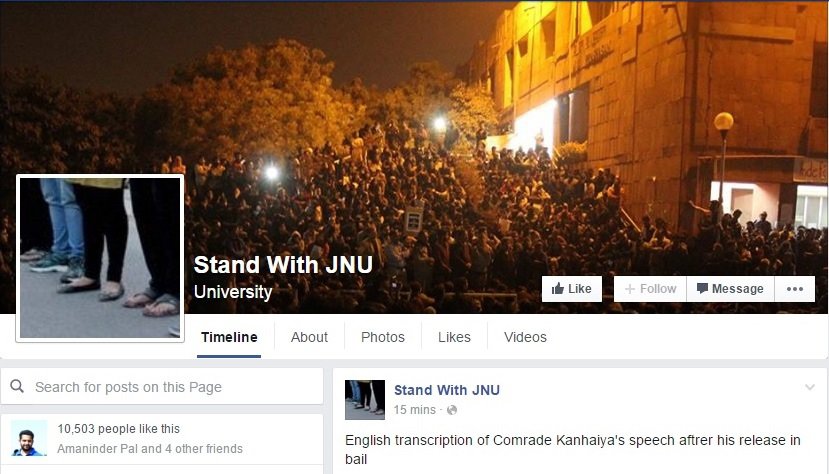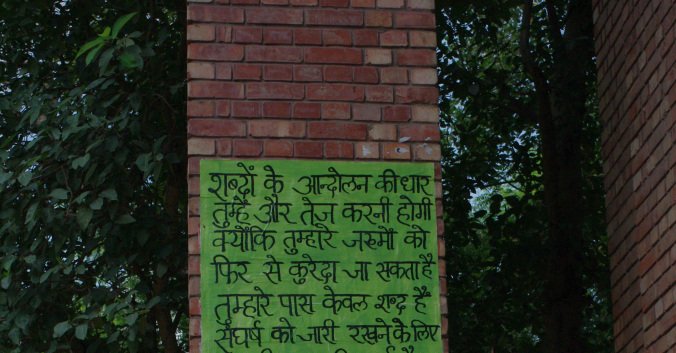What Are Exoplanets And How NASA Detects Life Beyond Our Solar System
Bharti Airtel Set To Acquire Telenor India Within This Year
Google Celebrates NASA’s Discovery Of Seven Earth-Like Planets With An Animated Doodle
Some Home Remedies That Might Sound Bizarre But Actually Work Like A Charm
Akshay Kumar Feels He Has Made Enough Money, Now Wants To Focus On Content & Characters
Delhi ATM Dispenses Fake Rs 2000 Notes From ‘Childrens Bank of India’ With ‘Churan Lable’
Adolf Hitler’s Personal Telephone During World War II Is Up For Auction In The US
From Salman Khan To Rekha, Neil Nitin Mukesh’s Wedding Reception Was Quite A Starry Affair
JNU’s Students Came Together In The Battle Against Kanhaiya Kumar Being Arrested
On February 12 when JNU Students Union head Kanhaiya Kumar was arrested from the campus on charges of sedition, the reaction was muted. Classes went on as usual. But that changed by evening, as the news spread like wildfire and students reacted with shock and confusion. There was considerable anger on the campus, but no display of it yet. It was then that the faculty at JNU took it upon themselves to fight what they believed was the high-handedness and attack on freedom of speech by the government and the police. Their decision catalysed a students' movement that made national headlines and ensured their voice never went unheard in the debate on nationalism and Kanhaiya Kumar's arrest.
"People were already taking their protest to social media platforms, but channelising that was needed. We created the Facebook page Stand With JNU (it has has more than 10,000 likes) which proved very useful," Vikas Rawal, a professor of Economics at JNU, who led the group, said.
"Actually, multiple pages were created, but this picked up the most," he said.
No stopping them
From then on, the movement grew organically. "To say that students coordinated under a pre-planned strategy is not right. In the fast-changing environment, after the arrest of Kanhaiya, the students took to different roles almost without any order," said a student without wanting to be named.
Students from all left-leaning parties, and even otherwise, joined hands and dropped differences.
It was also then that JNUSU's vice-president Shehla Rashid took over as the face of the student angst. "It was largely because she was the only one left of the four JNUSU's office-bearers at the campus. While president Kanhaiya was in jail, general secretary Rama Naga had gone underground. Joint secretary Saurabh Sharma (from ABVP) belonged to the other faction" said Rahul N.

We buried our differences
"The students who are fighting this battle belong to diverse ideological backgrounds but what acted as an immediate effect of the February 12 police raid was that each of us buried our differences under the sleeve and decided to fight together. We are trying to reason with Fascism. Teachers played an important role in guiding the movement," she said.
"When the media began targetting and maligning JNU students, we decided to utilise the space of democratic media - social media. The movement was also in flux. So if we had a particular plan on a particular day or time, we would easily restructure it around happenings outside JNU," she said.
Virender, another student, said, "Protests or strikes are nothing new at the campus. In that sense, we were experienced enough to carry out excellent coordination during the protest."
"Each one of us knew what to do, without having been assigned a job. For example, while we would go about collecting money for photocopying posters, a team had already designed and prepared a soft copy of the posters. Then we would distribute these among the students, who would then start campaigning in their respective hostels. A few of us took the job of pasting them over the walls," he said.
In fact, changes in schedule happened many a times. One such example was when members of ABVP invited army veterans near University's administration block, where already, protests against government were on in the form of lectures on nationalism.
"JNUSU took a decision to postpone its lecture so as to avoid any possible confrontation, which could have heavily damaged the cause of students," a student said.
JNU insiders added there were clear instructions from the office-bearers and activists to debate and discuss JNU crisis on social media and expand the flow of information to the wider audience.
The rally that made a difference
All the efforts culminated in the form of a massive rally on February 18, which proved to be a big day in the crisis. Led by All India Students Federation (AISF), a protest march as carried out from Mandi House to Parliament Street in Delhi, despite an appeal by JNU's Vice-Chancellor to reconsider their decision. Thousands of people, including teachers and students from various universities, lawyers, academicians, artists and activists, joined in - making it a people's movement. Watch the video of the rally here:





